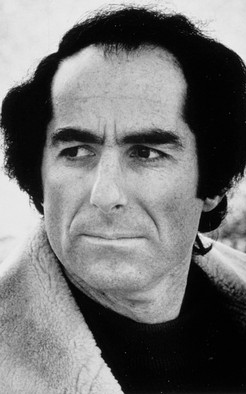Philip Roth: Difference between revisions
No edit summary |
m (added Category:Library of Congress Living Legend using HotCat) |
||
| (One intermediate revision by the same user not shown) | |||
| Line 2: | Line 2: | ||
{{creatorstub}} <!-- please leave this here until the page has either a bibliography or creatortropes section - or, preferably, both --> |
{{creatorstub}} <!-- please leave this here until the page has either a bibliography or creatortropes section - or, preferably, both --> |
||
[[File:Philip Roth - 1973.jpg|thumb|300px|Philip Roth in 1973.]] |
[[File:Philip Roth - 1973.jpg|thumb|300px|Philip Roth in 1973.]] |
||
'''Philip Roth''' |
'''Philip Roth''' (March 19, 1933 - May 22, 2018) was the Pulitzer-winning author of such acclaimed novels as ''[[Portnoy's Complaint]]'', ''[[The Human Stain]]'', ''[[American Pastoral]]'', ''[[The Plot Against America]]'' and the novella ''[[Goodbye, Columbus]]''. |
||
His works largely revolve around several recurring themes - family, sex, America, the Jewish experience, and above all Philip Roth. Everything he writes invariably features some kind of [[Author Avatar]], be it a standalone character (most famously Alexander Portnoy), his recurring character Nathan Zuckerman, or even Roth himself (in which case the degree of autobiographical honesty ranges from "lots" to "almost none" to "not telling"). He always |
His works largely revolve around several recurring themes - family, sex, America, the Jewish experience, and above all Philip Roth. Everything he writes invariably features some kind of [[Author Avatar]], be it a standalone character (most famously Alexander Portnoy), his recurring character Nathan Zuckerman, or even Roth himself (in which case the degree of autobiographical honesty ranges from "lots" to "almost none" to "not telling"). He always portrayed "himself" as a cynical, neurotic intellectual, tinged with misogyny and self-loathing; generally the older the character is, the more pronounced his flaws. |
||
Roth |
Roth was known for his distinctive writing style, which is at once analytical, impassioned, confessional, foul-mouthed and extremely verbose. |
||
{{reflist}} |
{{reflist}} |
||
| Line 12: | Line 12: | ||
[[Category:{{PAGENAME}}]] |
[[Category:{{PAGENAME}}]] |
||
[[Category:Authors]] |
[[Category:Authors]] |
||
[[Category:Library of Congress Living Legend]] |
|||
Latest revision as of 17:56, 17 October 2022
This Creator page is a stub. You can help All The Tropes by expanding it. If you have checked or updated this page and found the content to be suitable, please remove this notice. |

Philip Roth (March 19, 1933 - May 22, 2018) was the Pulitzer-winning author of such acclaimed novels as Portnoy's Complaint, The Human Stain, American Pastoral, The Plot Against America and the novella Goodbye, Columbus.
His works largely revolve around several recurring themes - family, sex, America, the Jewish experience, and above all Philip Roth. Everything he writes invariably features some kind of Author Avatar, be it a standalone character (most famously Alexander Portnoy), his recurring character Nathan Zuckerman, or even Roth himself (in which case the degree of autobiographical honesty ranges from "lots" to "almost none" to "not telling"). He always portrayed "himself" as a cynical, neurotic intellectual, tinged with misogyny and self-loathing; generally the older the character is, the more pronounced his flaws.
Roth was known for his distinctive writing style, which is at once analytical, impassioned, confessional, foul-mouthed and extremely verbose.